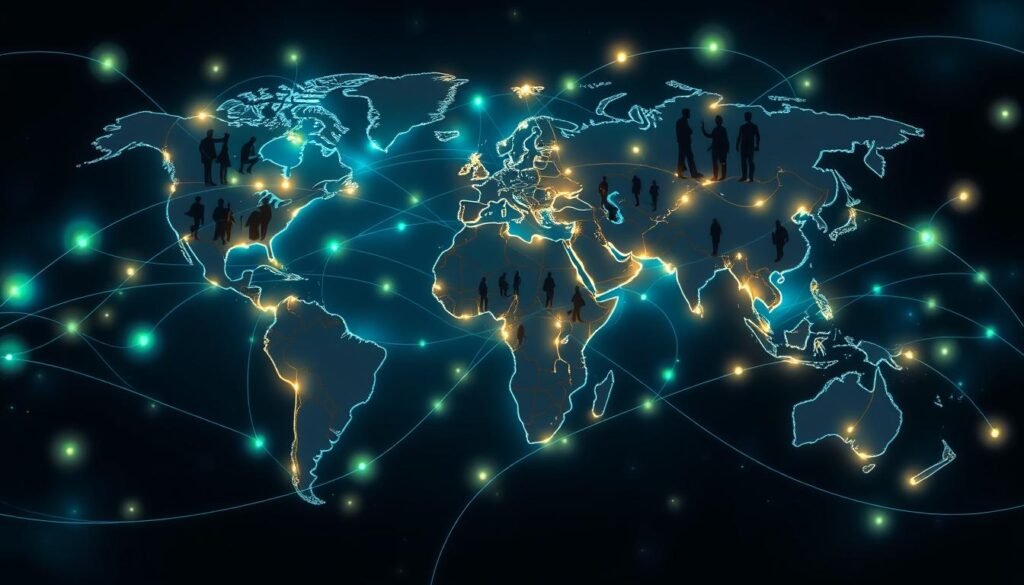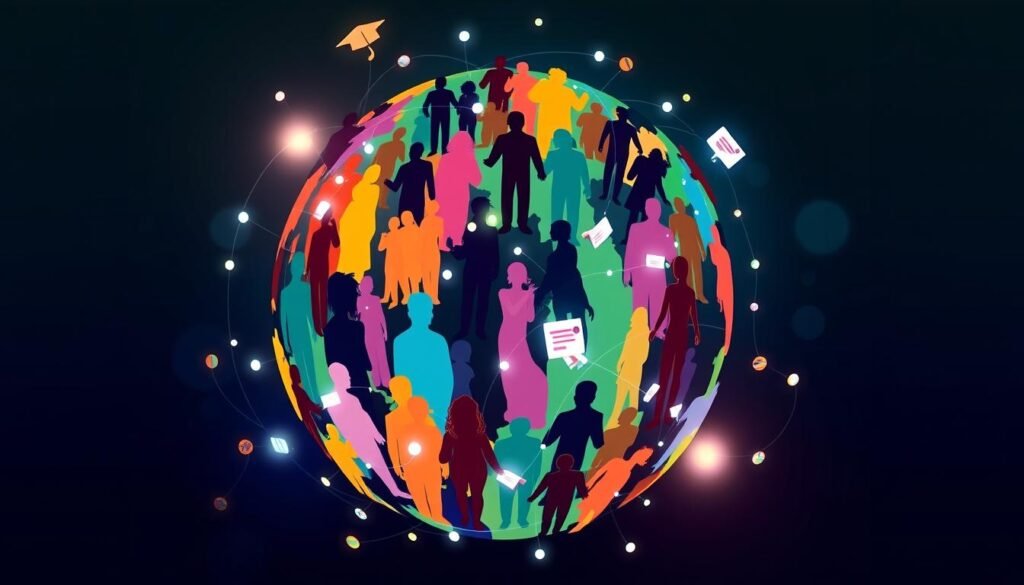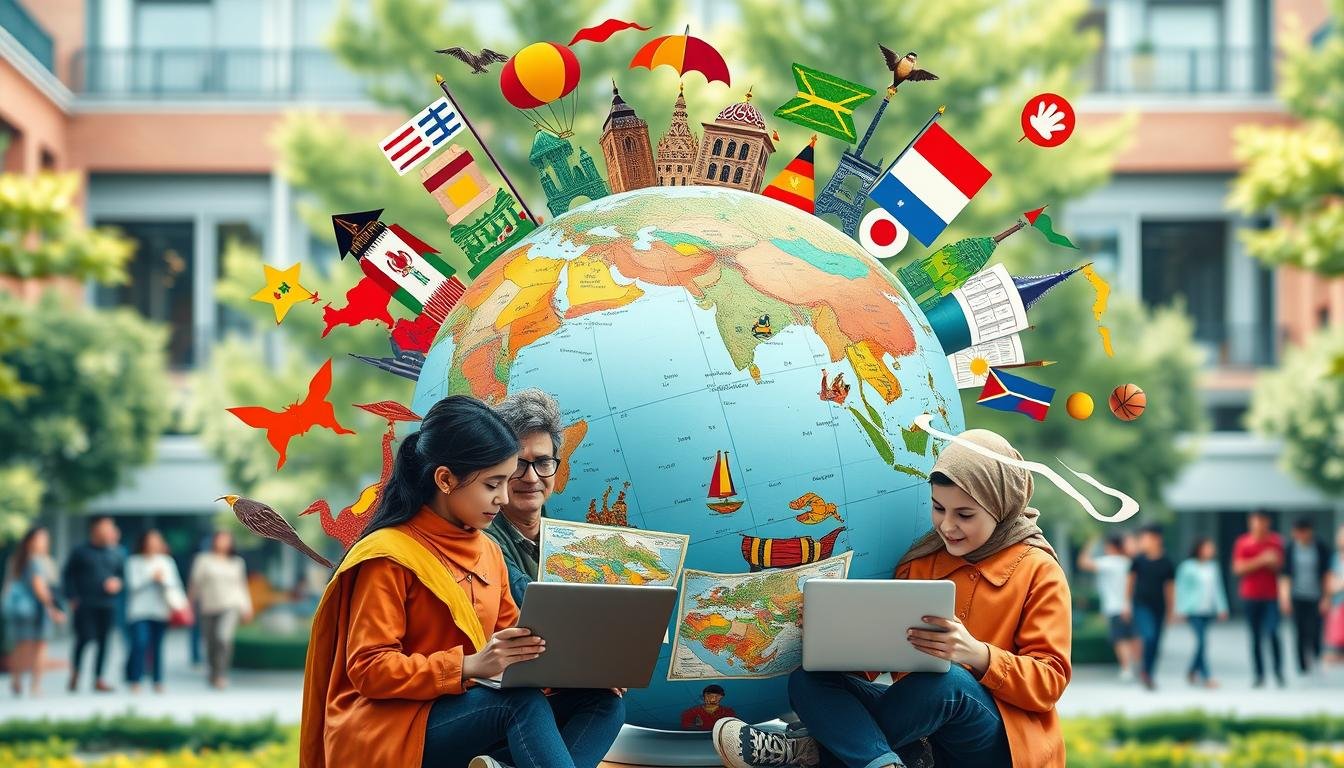Have you ever wondered how international experience could elevate your master’s program and set you apart in the job market? Expanding your horizons beyond your home country can unlock a world of personal and professional growth opportunities. But what exactly can you gain from an international learning experience, and how can it benefit your future career?
Key Takeaways
- Develop cultural intelligence and a global mindset to navigate diverse business environments
- Gain exposure to varied perspectives and understand cultural nuances
- Enhance critical thinking and problem-solving skills through international collaboration
- Build resilience and adaptability by stepping out of your comfort zone
- Expand your professional network on a global scale
Develop Cultural Intelligence and Global Mindset
Embarking on an international master’s program can be a transformative experience, allowing you to cultivate a cultural intelligence and global mindset that are highly valued in today’s interconnected world. By immersing yourself in diverse perspectives, you’ll gain a deeper understanding of cultural nuances and norms, fostering an adaptable and open-minded approach to personal and professional challenges.
Gain Exposure to Diverse Perspectives
Living and working alongside classmates from various cultural backgrounds exposes you to a rich tapestry of diverse perspectives. This cross-cultural exchange broadens your horizons, challenges your assumptions, and equips you with the ability to navigate cultural awareness in global settings.
Understand Cultural Nuances and Norms
An international master’s program allows you to delve into the intricacies of different cultures, customs, and professional practices. By observing and adapting to these cultural nuances, you’ll develop the flexibility and adaptability to thrive in a variety of global contexts.
Enhance Critical Thinking and Problem-Solving Skills
Pursuing a master’s program with an international focus can significantly enhance your critical thinking and problem-solving abilities. A recent survey by the British Council found that international experiences impact an individual’s capacity to innovate in the workplace. This is supported by evidence that such experiences improve skills vital for innovation, including critical thinking, problem-solving, creativity, teamwork, communication, and openness to new ideas and cultures.

By immersing yourself in a diverse, global academic environment, you’ll have the opportunity to tackle complex, real-world challenges from multiple perspectives. This exposure to diverse viewpoints and problem-solving approaches will hone your critical analysis skills, allowing you to evaluate situations more objectively and develop innovative solutions. Moreover, the need to navigate unfamiliar cultural nuances and adapt to new surroundings will cultivate your versatility and resilience – valuable assets in today’s dynamic, interconnected workforce.
Whether you’re collaborating on international case studies, participating in global business simulations, or engaging in cross-cultural project management, a master’s program with an international focus will equip you with the critical thinking and problem-solving expertise to thrive in a rapidly evolving, globalized economy. This unique set of skills will make you a valuable asset to any organization, setting you apart in the competitive job market.
Build Resilience and Adaptability
Embracing an international experience during your master’s program can be a transformative journey that fosters resilience and adaptability. As you step outside your comfort zone and navigate unfamiliar environments, you’ll be challenged to confront and overcome a myriad of obstacles, from bureaucratic hurdles to cultural nuances. This process of adapting to new circumstances not only strengthens your initiative and resourcefulness, but also equips you with the skills to thrive in dynamic, ever-changing work environments.
Step Out of Your Comfort Zone
The decision to pursue an international master’s program demonstrates a remarkable willingness to take initiative and confront challenges head-on. From navigating complex visa applications to understanding local tax systems and communication norms, you’ll be forced to step outside your comfort zone and find innovative solutions. This experience can be deeply rewarding, as it fosters a heightened sense of resilience and the ability to adapt to unfamiliar situations.
Navigate Unfamiliar Environments
Living and studying in a foreign country requires you to engage with a diverse range of people, cultures, and systems. As you immerse yourself in this unfamiliar environment, you’ll develop a keen eye for observing and understanding cultural nuances, enabling you to adapt your communication and behavior accordingly. This adaptability is a highly sought-after skill in the modern workforce, as it equips you with the agility to thrive in dynamic, global settings.
Expand Professional Network Globally
Immersing yourself in an international environment opens the door to a vast global network. From managers and colleagues to counselors and international social clubs, you’ll find a wealth of connections that can lead to exciting global opportunities. While navigating the logistical, mental, and emotional challenges of working abroad may seem daunting, the rewards of international work experience far outweigh the costs.
Programs like those offered at The Continents States University are designed to jumpstart your global career. By fostering a diverse, internationally-minded community, these programs cultivate candidates who are not only culturally aware and skilled, but also highly competitive in the job market. This can ultimately lead to a successful, long-term international career path.

Expanding your professional global network is a key benefit of immersing yourself in an international environment. By connecting with individuals from diverse backgrounds and cultures, you’ll gain exposure to new perspectives, ideas, and opportunities that can greatly enhance your personal and professional development. This global mindset and cultural intelligence will make you a more attractive candidate for international roles, opening doors to a world of possibilities.
Acquire Language Proficiency and Communication Skills
Spending time in a different country offers an invaluable opportunity to improve your language proficiency and communication skills. In today’s global job market, the ability to effectively communicate in multiple languages is highly valued by international organizations. One of the best ways to develop fluency in a language is through full immersion, and candidates who take advantage of their time abroad to enhance their language skills are often seen as indispensable assets.
Immerse in Language Learning
By living and studying in a foreign country, you’ll have ample chances to practice your language abilities in real-world settings. From daily interactions with locals to attending classes conducted in the native tongue, this immersive experience can significantly accelerate your language learning journey. As you navigate unfamiliar environments and engage in cross-cultural communication, your language proficiency and communication skills will steadily improve, making you a more attractive candidate for language learning and fluency in the global job market.
The opportunity to fully immerse yourself in a new language and culture can be transformative, both personally and professionally. By committing to the challenge of language learning, you’ll not only enhance your communication skills but also develop a deeper understanding and appreciation for diverse perspectives. This invaluable experience can set you apart as a versatile, globally-minded individual, poised to thrive in an increasingly interconnected world.
balancing part-time work during full-time master’s studies
Pursuing a master’s degree at The Continents States University while also managing a part-time job can present unique challenges, but with effective time management strategies and support systems in place, students can thrive. The university’s flexible online learning options and personalized academic support allow students to create a schedule that suits their needs, while the competency-based education approach enables them to progress at their own pace.
By leveraging the university’s scholarship opportunities and innovative digital learning platform, students can minimize financial stress and focus on excelling academically while also gaining valuable work experience. This allows them to develop essential time management, prioritization skills, and stress management techniques that will serve them well in their future careers.
The university’s strong support systems, including academic advising, mental health resources, and peer-to-peer networks, help students maintain a healthy work-life balance and ensure their academic performance doesn’t suffer despite the demands of balancing part-time work and full-time master’s studies. With the right approach and institutional support, students can maximize the benefits of their educational journey while also gaining practical experience through flexible schedules and online learning.
Stand Out in the Competitive Job Market
In today’s competitive job landscape, international experience can be a game-changer. Employers highly value the unique blend of skills and qualities that a global education can foster. From demonstrating initiative and versatility to showcasing your problem-solving abilities, your time abroad can set you apart from the crowd.
Demonstrate Initiative and Versatility
Embarking on an international master’s program showcases your ambition and resourcefulness. Navigating unfamiliar environments, adapting to cultural nuances, and stepping out of your comfort zone all speak volumes about your ability to take on challenges and thrive in dynamic situations. Hiring managers appreciate these transferable skills, as they are indicative of a versatile and innovative mindset – traits that are highly sought after in the modern workplace.
Furthermore, the British Council’s research has found that 68% of job seekers reported their international experience helped them secure employment. Whether it’s an internship or a long-term position abroad, the skills you’ve acquired, such as problem-solving and cultural intelligence, can give you a competitive edge in the job market.
Placing yourself within a global network also opens doors to a wide range of opportunities. The international community you’ve built can serve as a valuable resource, leading to potential job prospects and further avenues for professional growth.
Gain Real-World International Business Experience
One of the most valuable aspects of pursuing a master’s program is the opportunity to gain real-world international business experience. Through global case studies and applied learning exercises, students can immerse themselves in simulated work scenarios and collaborate with peers to tackle complex, cross-cultural challenges.
Participate in Global Case Studies
Business schools often partner with multinational companies to provide students with in-depth case studies that reflect the realities of the global marketplace. By delving into these real-world business problems, you’ll develop a deeper understanding of cultural nuances, decision-making in uncertain environments, and the importance of adaptability and problem-solving skills.
These global case studies go beyond traditional classroom learning, allowing you to apply your knowledge and work alongside classmates from diverse backgrounds. The collaborative nature of these exercises not only enhances your teamwork abilities but also exposes you to different perspectives and approaches to problem-solving.
The measurable results you achieve during these simulations will demonstrate your readiness to tackle the challenges of an international business career, setting you apart in the competitive job market.
Prepare for Leadership Roles in Multinational Organizations
Today’s business landscape is more interconnected and global than ever before. Multinational organizations face a wide range of challenges, from climate change and sustainability to armed conflicts and supply chain disruptions. To navigate these complex global issues, they need leaders with a deep understanding of diverse perspectives and the ability to adapt to rapidly changing environments.
That’s where an international education can be invaluable. By immersing yourself in a globally-focused master’s program, you’ll develop the cultural intelligence and adaptability required to excel in leadership roles within multinational organizations. You’ll gain exposure to diverse viewpoints, learn to navigate cultural nuances, and hone your critical thinking and problem-solving skills – all essential for success in today’s interconnected business world.

Moreover, the international experience you gain during your studies will prepare you to take on the challenges and responsibilities of leadership in a multinational setting. You’ll learn to thrive in unfamiliar environments, build a global professional network, and acquire language proficiency – all of which will make you a more versatile and valuable asset to any organization operating across borders.
So if your aspirations include reaching the upper echelons of multinational companies, a master’s program that emphasizes international exposure and global competencies is an essential stepping stone. By developing the adaptability and leadership skills required to navigate the interconnected business environment, you’ll be well-positioned to take on the most pressing challenges facing today’s global organizations.
Benefit from Diverse and Globally Recognized Faculty
When you choose a master’s program that prioritizes global immersion, you’ll have the opportunity to learn from a diverse and internationally renowned faculty. These experts bring a wealth of international perspectives and industry expertise to the classroom, enriching the educational experience for all participants.
At schools where global awareness is deeply rooted, students can engage with faculty members from around the world. This diverse faculty not only shares their academic knowledge but also their real-world experiences, helping you develop a nuanced understanding of different cultures, business practices, and problem-solving approaches.
Beyond the classroom, you may also have the chance to learn directly from successful alumni who have become industry leaders. These guest speakers provide valuable insights and mentorship, broadening your professional network and preparing you for the demands of a globally connected workplace.
Access to Global Alumni Network
One of the most valuable aspects of pursuing a master’s degree with a diverse and international student body is the opportunity to build a lifelong global alumni network. Your classmates from around the world can become valuable business partners, colleagues, or even future investors. Universities with a strong international focus typically have alumni spread across the globe, creating a powerful network for you to tap into long after graduation.
Mentorship and Career Opportunities
These globally-connected alumni come together regularly to attend events, access mentorship opportunities, and learn about exclusive job listings. By tapping into this international community, you can gain valuable insights, industry connections, and even career-advancing opportunities that may not be available through more localized alumni networks. Leveraging your global alumni network can be a game-changer in your professional development and career trajectory.

The ability to connect with a diverse and international alumni community is a key advantage of choosing a master’s program with a strong global outlook. This global network can open doors to mentorship, career opportunities, and collaborative ventures that can significantly enhance your professional success and personal growth.
Explore Study Abroad and Exchange Programs
As you embark on your master’s program, consider the valuable opportunities available through study abroad and exchange programs. Many universities offer students the chance to expand their global horizons by attending classes at partner institutions in different parts of the world. These study abroad and exchange programs not only immerse you in diverse cultures but also provide unique perspectives that can enrich your academic and personal growth.
Numerous schools are members of international educational alliances, making it easier for students to attend classes on multiple campuses around the globe. For instance, at The Continents States University, you can choose to study at up to three different international campuses in a given year, allowing you to gain a variety of diverse experiences. The university also offers week-long global education experiences called City Seminars, which take you to various business hubs worldwide.
Exploring joint degree programs offered in partnership with institutions in other countries can also be a valuable option. These programs enable you to earn a globally recognized qualification while experiencing different educational systems and cultural environments. By embracing the opportunities for international education, you’ll develop a global mindset, enhance your critical thinking, and position yourself for success in the increasingly interconnected world.
Consider International Campuses and Joint Degrees
Pursuing a master’s degree today extends far beyond the traditional boundaries of a single campus. A growing number of schools are part of international educational alliances, making it easier for students to attend classes on multiple campuses and gain diverse global experiences.
These alliances include prestigious networks like CEMS (the Global Alliance in Management Education), the Global Network for Advanced Management, the EMBA Consortium for Global Business Innovation, the Future of Management Education (FOME) Alliance, and the Quantitative Techniques for Economics and Management network. By tapping into these global partnerships, you can explore international campuses and joint degree programs that offer a truly global education.
Similarly, some universities, such as The Continents States University, maintain multiple campuses around the world, allowing you to immerse yourself in diverse experiences and cultures during your master’s studies. These international campus options provide unparalleled opportunities to develop your cultural intelligence, language skills, and adaptability – all invaluable assets for success in the global marketplace.
Conclusion
Pursuing an international master’s program is a transformative experience that goes beyond the curriculum. By immersing yourself in a global environment, you cultivate a deeper cultural intelligence and a more expansive mindset. Stepping out of your comfort zone and navigating unfamiliar settings can stimulate your learning and help you develop invaluable resilience and adaptability skills.
Understanding cultural nuances and diverse perspectives is crucial for professional success in today’s interconnected world. The ability to empathize, communicate effectively, and solve complex problems across borders will set you apart in the competitive job market. An international master’s program equips you with the global expertise and language proficiency to excel as a leader in multinational organizations.
Moreover, the connections and networking opportunities afforded by a globally recognized faculty and alumni network can open doors to mentorship, career advancement, and lifelong learning. By choosing a master’s program that offers international campus locations and study abroad options, you can further amplify your global experience and exposure.
Source Links
- The Value of International Work Experience – https://online.edhec.edu/en/blog/the-value-of-international-work-experience/
- The Benefits of International Study | AACSB – https://www.aacsb.edu/insights/articles/2024/03/the-benefits-of-international-study
- Highlight International Experience On Your Resume – https://www.mba.com/explore-programs/study-destinations/highlight-international-experience


